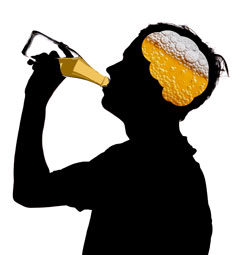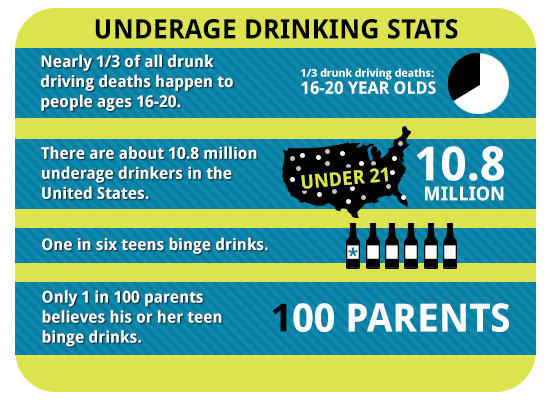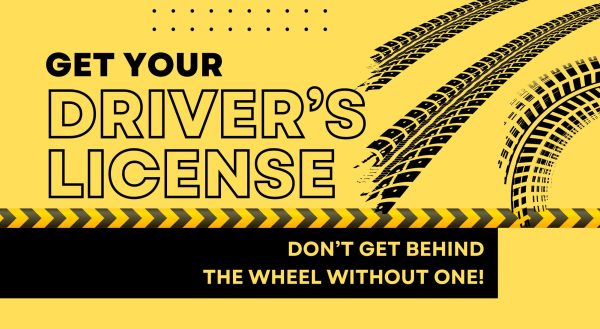Underage drinking is not going away

A recent Youth Risk Behavior Survey found that among high school students, during the past 30 days
- 35% drank some amount of alcohol.
- 21% binge drank.
- 10% drove after drinking alcohol.
- 22% rode with a driver who had been drinking alcohol.
What does that add up to? How many people have had just a few sips before the age of 21? About 10.8 million people, all before they are to the legal drinking age. How many people have had an entire glass before the age of 21? about 70% of all teens. And those numbers are not going down.
Teenagers don’t always quite understand the consequences of underage drinking. They are not thinking ahead or considering all possibilities when they take a d rink, or when they take two, or when they get into the car with someone else who has been drinking.
rink, or when they take two, or when they get into the car with someone else who has been drinking.
Of course, all teens have heard of the consequences: alcohol poisoning, wrecks that kill and maim. What is talked about less but is even scarier are the more subtle effects of drinking under the age of 21, especially on a regular basis.
For example, people under the age of 20 have brains that have not fully developed and is still developing. Drinking alcohol can interfere with that process and harm brain cells. Teens who drink tend to have lower grades, more absences, and are more prone to fighting or social problems. They can have a disruption of normal growth and sexual development. They are more likely to be physically or sexually assaulted.
If underage drinking is so bad, or at least holds the potential for so many horrible consequences, why do teens do it? Well, peer pressure has always been a common issue for convincing non-drinking teens to imbibe. Usually when a minor drinks they drink because someone close to them pressured them into doing it.
There are also teens who drink to feel more grown up, who think it makes them look sophisticated and adult. Many teens see their parents drink and think that it must not be a bad thing if their parents do it. They don’t stop to realize that their parents have fully-developed bodies and more maturity. And, unfortunately, there are teens who drink to self-medicate and try to solve the problems they are having.
For anyone not sure that teen drinking is widespread, here are some more facts: The most recent figures published on the CDC website indicate that people aged 12 to 20 years old drink 11 percent of all the alcohol consumed in the United States, and more than 90 percent of this alcohol is consumed in binge drinking; underage drinkers consume more drinks per drinking occasion than adult drinkers; 190,000 underage drinkers ended up in the emergency room in 2008 for injuries and other alcohol-related conditions; 10 percent drove after drinking and 28 percent rode with someone who had been drinking.
So, what’s the solution? Nothing short of more effort by everyone who deals with teens: parents, teachers, and, maybe most importantly, other teens. Parents should pay attention to their kids and what they are doing. Ask where they are going, and who they are going with. Make sure to talk with them when they come home – not only does that mean some valuable conversation time between teens and parents, but it also lets parents get a sense of if their teen is sober or not. Parents who drank when they were in high school and look at this all as a rite of passage need to realize how much more pervasive the problem has come in recent years and not glorify it to their children. Most importantly, don’t host parties for your children and their friends. It is highly illegal, dangerous, and could end in a tragedy for which the hosting parents would be legally liable.
Teachers, pay attention to your students and the conversations they have, the snippets you overhear. Let your students know that if they have a problem, they can always come share with you. Make sure that they know who and where the counselor is. If you hear rumors of students drinking, share what you hear with the counselor or administration.
Teenagers, be bold enough to think for yourselves. You know what the consequences for drinking can be – you hear it all the time in commercials and assemblies. Stop and think about what could happen if you take that drink. It always seems like the tragic stories teens hear will never “happen to me” but the truth is, for more than 5,000 teens a year, the thought that it would never happen to them was proven incorrect – but since they are dead now, they will never know that.






